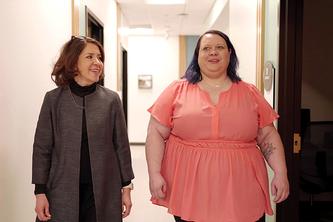
According to the Federal Trade Commission, consumers reported losing more than $5.8 billion to fraud in 2021, an increase of more than 70 percent over the previous year.
Marti DeLiema, an assistant research professor in the School of Social Work, studies the risk factors associated with financial fraud, provides expert tips for how to avoid financial fraud, and identifies what to do when you fall victim to scammers.
Q: What are some examples of common financial scams?
Prof. DeLiema: There are so many different types of scams that are trending right now. Like street crime, rates of reported fraud are on the rise. Scams to look out for include business imposter scams, where fraud criminals pretend to be the consumer’s bank, a tech support company or Amazon. The criminals call, email or text to alert the consumer about a “problem” with their account and proceed to request money to help resolve the problem. Romance scams are also on the rise and are responsible for the greatest average losses for consumers. What’s noteworthy is how fraud criminals have shifted their preferred method of payment in the last few years. Mass marketing scammers are demanding payment using gift cards, cryptocurrency and Zelle transfers. These payments are more instantaneous and harder to trace.
Q: What are ways to prevent financial scams?
Prof. DeLiema: Education and awareness are always the best tools in the fight against fraud. Fraud depends on successful deception—and it can happen to anyone. If the consumer is aware of the scam beforehand, the chance that they will be tricked by the scammer drops drastically. Consumers also need to be aware of red flags, such as requests for payment using gift cards. If someone requests or demands gift cards or to wire money, that’s a sign that it’s a scam, especially if that person claims they are with a company or government agency. We also need to treat everything we see and read online with a fair dose of skepticism, remembering that no government regulator is actively culling misinformation from the internet. This is especially true when it comes to fraudulent product claims and posts about items for sale that don’t really exist. There is very little enforcement against bad behavior on online marketplaces and social media.
Q: Who should you notify of attempted scams?
Prof. DeLiema: There are many organizations that accept fraud reports, including AARP, the Better Business Bureau, the Internet Crime Complaint Center and the United States Postal Inspection Services (for mail scams). For the most general reporting option, you can file a fraud or attempted fraud report with the Federal Trade Commission at reportfraud.ftc.gov. All of these organizations encourage people to report fraud attempts, regardless of whether money was stolen.
Q: What should you do if you fall victim to a financial scam?
Prof. DeLiema: In addition to reporting, if you’ve had money stolen, it is important you notify your bank or financial institution to report the fraudulent activity and to share any concerns about identity theft. You should also check your credit report and place a freeze on your credit to prevent criminals from using your identity to open new credit cards or take out loans using your personal information. Changing passwords is also a good idea. In the more extreme cases, I’ve known victims who have chosen to change their phone number to stop incessant scam calls. Others close their social media accounts and create new email accounts so that the fraud criminals no longer can contact them.
Q: \Where can consumers find additional information about preventing and reporting financial scams?
Prof. DeLiema: AARP has some excellent fraud awareness information available through the Fraud Watch Network. The Better Business Bureau has Scam Tracker, an interactive fraud reporting website where people can read reports from other fraud reporters in their geographic area and search for similar scams on an interactive map. And the Federal Trade Commission website always has great information summarizing trending scams and detailing how the scams work.
Marti DeLiema, Ph.D., is a research assistant professor in the College of Education and Human Development. Her research specialties include aging, retirement security, elder abuse and neglect, elder financial exploitation and financial fraud.
-30-
About the College of Education and Human Development
The University of Minnesota College of Education and Human Development (CEHD) strives to teach, advance research and engage with the community to increase opportunities for all individuals. As the third largest college on the Twin Cities campus, CEHD research and specialties focus on a range of challenges, including: educational equity, teaching and learning innovations, children’s mental health and development, family resilience, and healthy aging. Learn more at cehd.umn.edu.
About “Talking...with U of M”
“Talking...with U of M” is a resource whereby University of Minnesota faculty answer questions on current and other topics of general interest. Feel free to republish this content. If you would like to schedule an interview with the faculty member or have topics you’d like the University of Minnesota to explore for future “Talking...with U of M,” please contact University Public Relations at [email protected].





